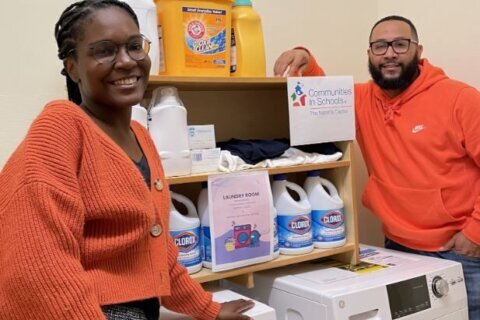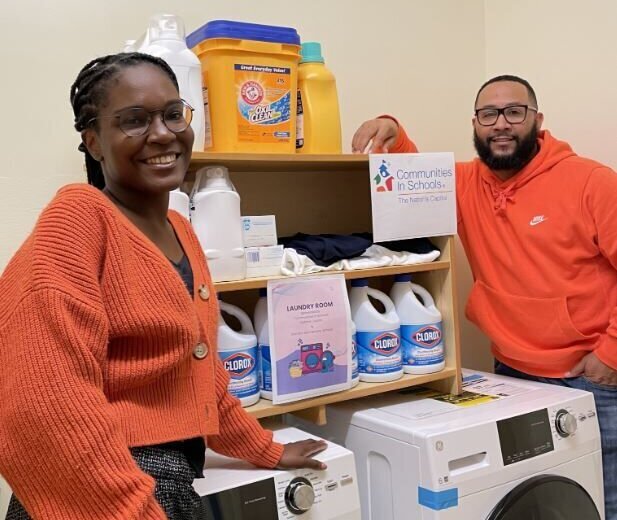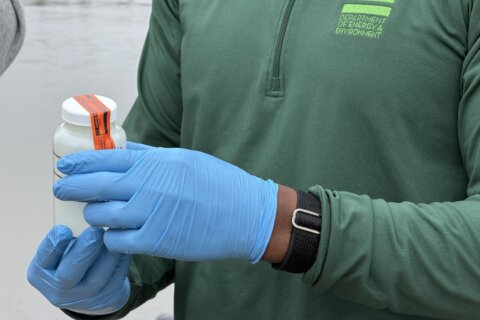
While working as a community liaison with the group Communities in Schools of the Nation’s Capital at Kelly Miller Middle School in Northeast D.C., Jovan Johnson noticed some students didn’t come to school because they lacked clean clothes.
They’d get teased because of it, and, as a result, it deterred them from attending class. So he started talking to some of the administrators to figure out a way around that challenge.
For the students he worked with, Johnson offered to take their dirty clothes and wash them. The school already had a washer and dryer on site for sports uniforms. Johnson promised to keep the arrangement confidential. They’d bring him dirty clothes in their backpacks, and he’d return at least two days worth of clean clothes on Fridays.
When he became site coordinator at Stanton Elementary School in 2022, he used the same model. But there, the group applied for grant funding to buy a washer and dryer and have it installed. Pipes had to be set up from the girls bathroom into the nearby utility closet, and they had to buy a vent-less dryer because there wasn’t any ventilation.
Communities in Schools, which works nationally toward preventing students from dropping out, has been working with D.C. Public Schools for a decade. This school year, the organization is working with almost 4,500 K-12 students across the city, addressing academics, behavior and attendance.
In that realm, its efforts are working. Absenteeism has been a challenge for school districts across the country in the aftermath of the pandemic. Since the washer and dryer were installed, Johnson said the school’s in-seat attendance rate has improved by 10%.
“It was a small idea to something that I noticed, but it helped out [with] a tremendous impact,” Johnson said.
Students may miss school for a handful of reasons, he said. Sometimes, they’re afraid of going to school of because of community violence. In other cases, they may have to watch siblings at home, or their parents may not have the resources to get them to school on time.
The group uses incentives, such as coffee for parents and doughnuts for kids, as motivation. But in the case of lacking clean clothes, Johnson said many apartments don’t have washers or dryers, and communal laundry rooms may have machines that don’t work.
Access to clean clothes is essential, Johnson said, because sometimes comments about a student’s appearance or smell would escalate into fights during or after school. That, too, could deter students from going to class.
“We would like to address this chronic absenteeism in all schools,” Johnson said.
Now that they’re working with students at Cardozo High School, Johnson and Florangel Cuesta-Smith are presented with a different set of challenges. As the kids get older, some of them lose interest in school quickly, in part because of language barriers, Cuesta-Smith said.
“They try school maybe for a year, maybe two, and then they decide this is not for them,” Cuesta-Smith said. “If we don’t catch those students right away, we just lose them quickly.”
In other instances, students are missing family in other countries, or working through anxiety or depression. Some teenagers prefer to get a job and work instead.
The pair also plays a role in creating positive social media habits and making sure students keep coming to school in the aftermath of community violence.
“It happens so often that these kids think that’s everyday life,” Johnson said.
Mayor Muriel Bowser’s budget proposal for fiscal 2025 included a funding decrease for Communities In Schools of the Nation’s Capital. However, that funding was restored during a Committee of the Whole budget markup.
“While awaiting a final vote by the full Council, this development signifies a significant stride towards a brighter future for our students,” said Dr. Rustin Lewis, executive director of Communities In Schools of the Nation’s Capital.
Get breaking news and daily headlines delivered to your email inbox by signing up here.
© 2024 WTOP. All Rights Reserved. This website is not intended for users located within the European Economic Area.









